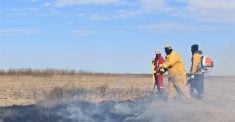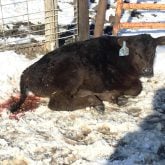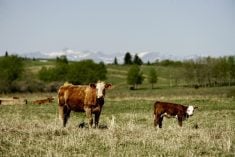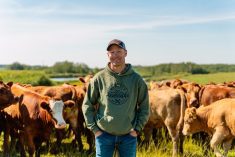Foodborne illness is something nobody wants to experience. It’s unpleasant, costly and, in the case of illness caused by E. coli 0157:H7, can cause lasting health problems or even death.
The total economic cost of E. coli 0157:H7-related illness is high — as are costs associated with its prevention. A newly released study shows that the benefits of prevention, in this case through a control program involving the vaccination of cattle, outweigh the costs of such a program by a ratio of three to one, or approximately $68 million annually.
Read Also

Reintroducing fire to Saskatchewan pastures
Pastures evolve over time. Woody plants and shrubs, which cattle can’t eat, may encroach on natural grasses. Invasive species, such…
“We looked at the cost of a vaccination program and compared that to the benefits,” says study author Kevin Grier of the Guelph-based George Morris Centre. “We found that the reduction in human illness and death, product recalls and lost consumer demand for beef far outweigh the cost of such a program.”
E. coli 0157:H7 can grow in the intestinal lining of cattle and is shed into the environment through their manure. A Canadian-developed vaccine, Econiche, has been shown to reduce the prevalence of E. coli 0157:H7 in cattle, marking the first time an animal vaccine has been developed to prevent human illness. Econiche was approved by the Canadian Food Inspection Agency in October 2008 and is the world’s first licensed vaccine against E. coli 0157.
The study estimates the cost to the industry of vaccinating Canada’s cattle herd with Econiche to be approximately $35 million annually. To evaluate the benefits of such a vaccination program, study authors looked at the impact on the reduction of human illness, the benefit to the industry of reduced product recalls and lost product and the impact of E. coli 0157: H7- related illness on consumer demand for beef.
The total annual benefit of reduced cost of illness as a result of a cattle vaccination program is estimated at approximately $21 million. Costs incurred by Canadian-based processing plants related to recalls and destruction of affected product could be reduced by an estimated $4 million through a vaccination program. But the biggest benefit comes in maintaining consumer demand for beef.
“With any food safety concern, consumers’ trust in the food system becomes compromised, which changes their behaviour,” says Grier. “In this case, it would decrease their beef consumption, which can have significant impacts on the industry.”
In a 2007 Harris Interactive poll, consumers surveyed indicated that they would at least temporarily stop buying the brand or product involved in a food recall. A trends survey completed by the Food Marketing Institute in 2007 also showed that outbreaks of foodborne illness are changing consumer behaviours, with 38 per cent of respondents indicating that safety concerns had stopped them from buying certain items, up from only nine per cent in 2006.
According to Grier, the George Morris study found that if food safety-related recalls can be reduced due to the reduction of E. coli 0157:H7 in the Canadian cattle herd, losses in consumer demand to the industry would be reduced by about $78 million.
“If we tabulate all of the benefits and measure those up against the cost of a vaccination program, the results show the benefits outweigh the cost by about $68 million annually,” says Grier.
In the United States, where Econiche is undergoing regulatory review, the United States Department of Agriculture (USDA)’s Food Safety and Inspection Service (FSIS) has developed a model to estimate just how much human illness caused by E. coli 0157:H7 can be prevented through the use of what the industry calls “pre-harvest interventions.”
“The model estimates the number of human illnesses that can be avoided if herd prevalence (of E. coli 0157: H7) drops by a given amount,” says an FSIS spokesperson. “This is important because the objective of the model is to estimate the marginal cost of human illnesses forgone as an intervention reduces cattle prevalence.”
Researchers developed a series of mathematical functions that relate the proportion of slaughtered cattle colonized or contaminated with E. coli 0157:H7 to the number of human illnesses due to beef consumption. These functions then allowed them to estimate the number of human illnesses that could be prevented if the proportion of affected live cattle in the U.S. decreases by a given amount. A second function — known in economics as a production function — then relates the cost of preventing cattle infection to the cost of human illnesses prevented.
“Our overall goal is to provide decision-makers with a tool for evaluating pre-harvest interventions that prevent foodborne illness,” says the spokesperson, but then added that FSIS has no immediate plans to apply its E. coli 0157:H7 model to formal decision-making. The spokesperson did indicate, however, that department officials believe that providing this type of information to decision-makers may help them to identify and explore the cost effectiveness of various methods, including vaccination, in preventing foodborne illness.
FSIS stressed that its model was precisely just that, a model, and that it did not apply its principles to any existing pre-harvest interventions. In field trials, use of vaccines such as Econiche has proven to be very effective at reducing the prevalence of E. coli 0157:H7 in cattle.
This past July, Nanos Research conducted a survey of 1,002 of Canadian consumers that indicated 53.3 per cent support or somewhat support the use of a vaccine to reduce the health risks in our food and water supply. A survey with a random sample of 770 Canadian cattle producers conducted by Strategic Research Associates (SRA) in May 2009 showed that farmers are also aware of the need to take action against E. coli 0157:H7. Approximately 88 per cent of producers surveyed indicated they thought it would be important that producers take action to prevent E. coli 0157:H7.
“The reasons for participation vary,” says John Vieira, SRA president, “and also depend on who might be expected to cover the cost of such a program.”
He added that food safety, the potential impact of recalls and access to export markets were the main reasons why farmers indicated they were in support of the concept of vaccination.















